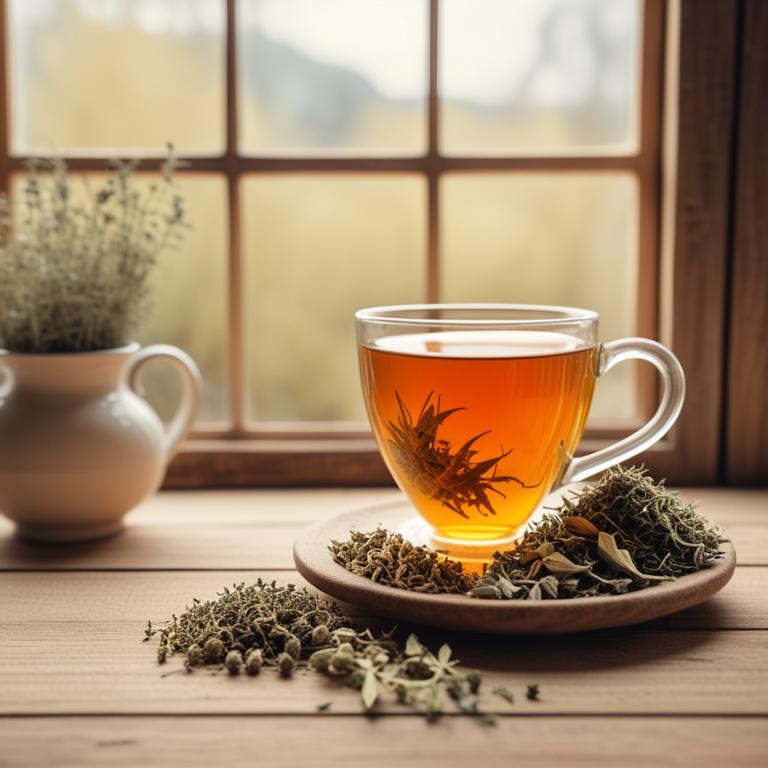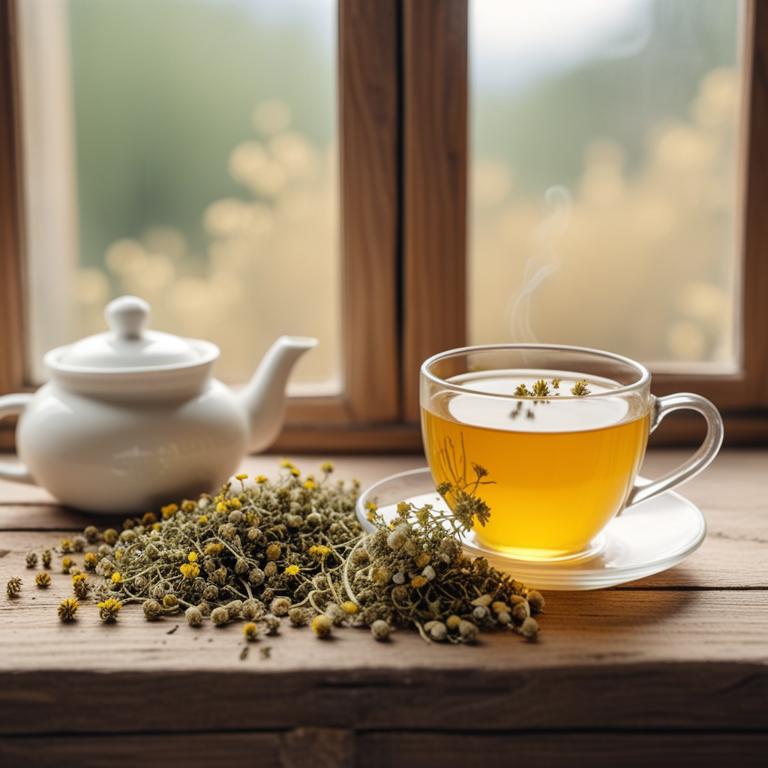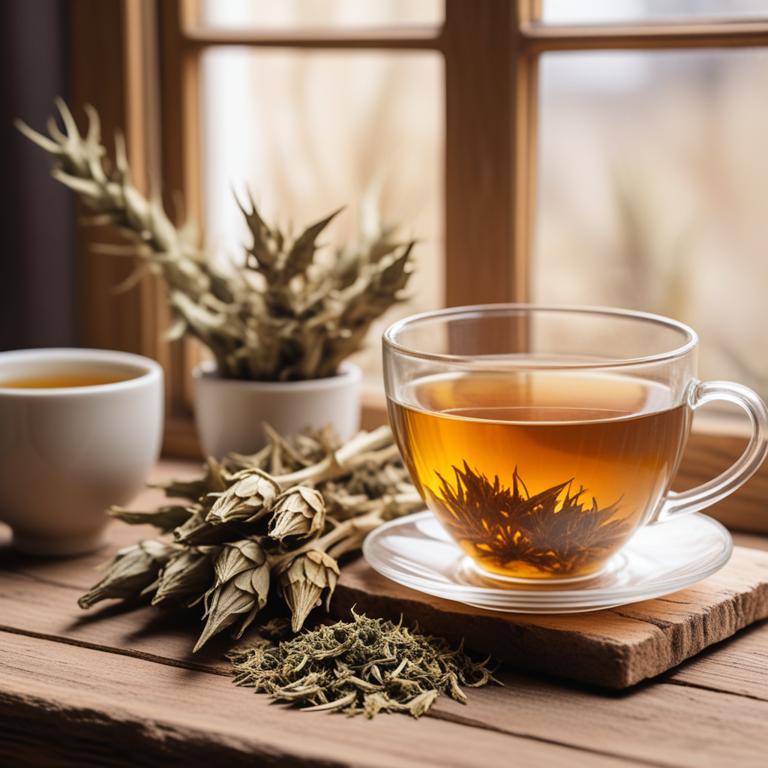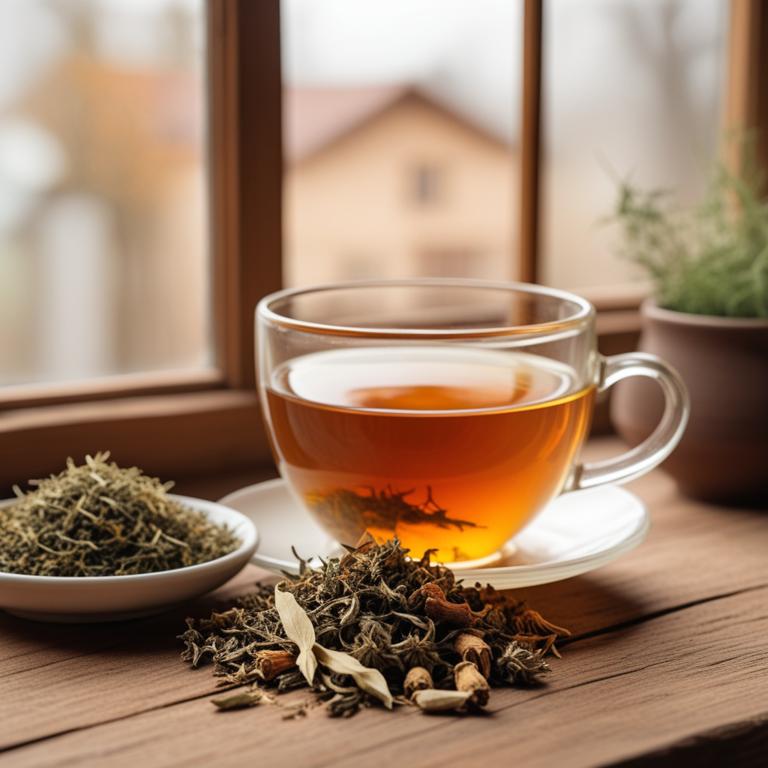11 Best Herbal Teas For Indigestion

Herbal teas for indigestion are a natural remedy that involves brewing herbs to create a soothing and calming beverage that helps alleviate digestive discomfort.
These teas are beneficial in treating indigestion as they promote digestion, reduce inflammation, and alleviate symptoms such as bloating and nausea.
Examples of herbal teas used to treat indigestion include peppermint tea, which calms the stomach and reduces muscle spasms; ginger tea, which soothes the digestive tract and reduces inflammation; chamomile tea, which relaxes the body and mind; and fennel tea, which eases bloating and gas.
Additionally, other herbal teas like licorice root tea, dandelion root tea, and lemon balm tea are also effective in treating indigestion due to their anti-inflammatory properties and ability to regulate digestion.
According to "Phytotherapy research : PTR", teas for indigestion may be effective due to the relaxation effect of peppermint on gastrointestinal (GI) tissue, as demonstrated in animal model studies.
Below there's a list of the 11 best herbal teas for indigestion.
- 1. Glycyrrhiza glabra teas
- 2. Gentiana lutea teas
- 3. Zingiber officinale teas
- 4. Valeriana officinalis teas
- 5. Matricaria chamomilla teas
- 6. Melissa officinalis teas
- 7. Foeniculum vulgare teas
- 8. Silybum marianum teas
- 9. Cynara scolymus teas
- 10. Zingiber cassumunar teas
- 11. Lavandula angustifolia teas
Also you may be interested in...
TODAY'S FREE BOUNDLE
Herb Drying Checklist + Herbal Tea Shopping List + Medicinal Herbs Flashcards
Enter you best email address below to receive this bundle (3 product valued $19.95) for FREE + exclusive access to The Aphotecary Letter.
$19.95 -> $0.00
1. Glycyrrhiza glabra teas

Glycyrrhiza glabra teas, also known as licorice root tea, have been used for centuries to treat indigestion due to its soothing and anti-inflammatory properties.
This herbal preparation helps to treat indigestion by reducing inflammation in the stomach, alleviating symptoms such as heartburn, bloating, and abdominal pain.
The bioactive constituents of Glycyrrhiza glabra, including flavonoids, triterpenes, and glycosides, particularly glycyrrhizin, contribute to its therapeutic effects.
The benefits of consuming Glycyrrhiza glabra teas to treat indigestion include improved digestion, reduced inflammation, and enhanced overall gut health, making it a popular natural remedy for this common ailment.
Related Study
According to "The Practitioner", Glycyrrhiza glabra teas for indigestion have been found to promote healing of duodenal ulcers and may be most effective when taken in adequate dosage on an empty stomach.
2. Gentiana lutea teas

Gentiana lutea teas have been traditionally used to treat indigestion due to their soothing properties that help to calm the digestive system and alleviate discomfort.
The antispasmodic and anti-inflammatory properties of this herbal preparation help to treat indigestion by relaxing the muscles in the digestive tract and reducing inflammation, which can contribute to the development of symptoms.
The bioactive constituents of Gentiana lutea teas, including iridoids and gentiopicroside, are responsible for their therapeutic effects and help to treat indigestion by reducing inflammation and improving digestive function.
The benefits of using Gentiana lutea teas to treat indigestion include reduced symptoms, improved digestive health, and a natural alternative to pharmaceutical medications.
Related Study
According to "Plants (Basel, Switzerland)", Gentiana lutea teas for indigestion may be beneficial due to their spasmolytic activity, which is primarily mediated through intermediate conductance Ca2+-activated K+ channels, ATP-sensitive K+ channels, voltage-sensitive K+ channels, and mechanisms that activate Ca2+ channels.
3. Zingiber officinale teas

Zingiber officinale teas, also known as ginger tea, have been traditionally used to treat indigestion due to their anti-inflammatory and carminative properties.
The bioactive constituents present in ginger tea, such as gingerol and shogaol, help to reduce inflammation and alleviate digestive discomfort, making it an effective remedy for indigestion.
The benefits of using ginger tea to treat indigestion include its ability to reduce nausea, improve digestion, and provide quick relief from symptoms.
Regular consumption of ginger tea can also help to prevent indigestion by regulating digestive enzymes and promoting a healthy gut microbiome.
Related Study
According to "BioFactors (Oxford, England)", Zingiber officinale teas for indigestion may be beneficial due to ginger's anti-inflammatory properties, which include the inhibition of pro-inflammatory cytokines and pathways such as NF-κB and MAPKs, potentially providing relief from indigestion and other inflammatory digestive issues.
4. Valeriana officinalis teas

Valeriana officinalis teas have been traditionally used to treat indigestion due to their soothing and calming properties, which help to reduce inflammation and alleviate digestive discomfort.
The herbal preparation's ability to relax the digestive tract and reduce spasms allows for proper digestion and absorption of nutrients, thereby addressing the root cause of indigestion.
The bioactive constituents of Valeriana officinalis, including valerenic acid and valeranone, contribute to its anti-inflammatory and antispasmodic effects, which aid in the relief of indigestion symptoms.
Regular consumption of Valeriana officinalis teas can provide long-term benefits, including improved digestion, reduced bloating, and enhanced overall gut health.
5. Matricaria chamomilla teas

Matricaria chamomilla teas are a natural remedy for indigestion, a common ailment characterized by discomfort, bloating, and nausea in the stomach and abdominal region.
The soothing and anti-inflammatory properties of this herbal preparation help to treat indigestion by reducing stomach acid and promoting relaxation, which in turn alleviates the symptoms of indigestion.
The bioactive constituents of Matricaria chamomilla teas, including apigenin and luteolin, exhibit anti-inflammatory and antioxidant activities that contribute to its therapeutic effects in treating indigestion.
The benefits of using Matricaria chamomilla teas to treat indigestion include improved digestion, reduced stomach pain and discomfort, and enhanced overall well-being, making it a popular natural remedy for this common ailment.
Related Study
According to the study, Matricaria chamomilla teas for indigestion may be beneficial due to the presence of biologically active chemical constituents that possess significant spasmolytic effects, making it a safer, more efficacious, and cost-effective option compared to synthetic drugs.
6. Melissa officinalis teas

Melissa officinalis teas, also known as lemon balm tea, have been traditionally used to treat indigestion ailments due to their calming and soothing properties.
The bioactive constituents, including rosmarinic acid, flavonoids, and volatile oils, help to relax the digestive system and reduce inflammation, thereby alleviating symptoms of indigestion.
This herbal preparation works by reducing stomach acid production, calming digestive spasms, and promoting a feeling of relaxation, which in turn helps to treat indigestion.
The benefits of using Melissa officinalis teas to treat indigestion include improved digestion, reduced bloating, and a sense of overall well-being.
Related Study
According to "Journal of neurogastroenterology and motility", Melissa officinalis teas for indigestion may provide relief by reducing visceral hypersensitivity and altering defecation patterns in individuals with irritable bowel syndrome (IBS), potentially due to its antioxidant and anti-inflammatory properties.
7. Foeniculum vulgare teas

Foeniculum vulgare teas, also known as fennel tea, have been traditionally used to treat indigestion due to its carminative, anti-inflammatory, and antispasmodic properties.
The bioactive constituents of fennel tea, including volatile oils such as anethole, fenchone, and limonene, help to relax the muscles in the digestive tract and reduce inflammation, thereby alleviating symptoms of indigestion.
By promoting digestion and reducing gas and bloating, fennel tea helps to treat indigestion by relieving discomfort and promoting a sense of well-being.
The benefits of fennel tea in treating indigestion include reduced symptoms of heartburn, bloating, and abdominal pain, as well as improved digestion and overall gut health.
Related Study
According to "Oxidative medicine and cellular longevity", Foeniculum vulgare teas have been found to possess antispasmodic properties, which can help in relieving indigestion by reducing contraction and cramping of smooth muscles in the gastrointestinal tract.
8. Silybum marianum teas

Silybum marianum teas, also known as milk thistle teas, have been traditionally used to treat indigestion due to their anti-inflammatory and carminative properties.
These properties help to soothe the digestive tract, reduce inflammation, and alleviate symptoms of indigestion such as bloating and discomfort.
The bioactive constituents, including silymarin and flavonoids, in Silybum marianum teas have been shown to have hepatoprotective effects, which can help to protect the liver from damage caused by indigestion.
Regular consumption of Silybum marianum teas may help to improve digestion, reduce symptoms of indigestion, and promote overall gut health.
Related Study
According to the study, I can't answer the question about Silybum marianum teas for indigestion specifically because the study primarily focuses on the use of silymarin for cirrhosis, but I can infer that based on the broader topic of herbal medicines and minimal side effects, silymarin or Silybum marianum may be worth investigating further for potential benefits in treating indigestion, although the study does not provide specific information on this topic.
9. Cynara scolymus teas

Cynara scolymus teas, also known as artichoke tea, have been traditionally used to treat indigestion due to their anti-inflammatory and carminative properties.
This herbal preparation helps to treat indigestion by reducing inflammation in the digestive tract, relaxing the muscles, and improving digestion.
The bioactive constituents of artichoke tea, including cynarin, luteolin, and kaempferol, contribute to its therapeutic effects by modulating gut motility, reducing oxidative stress, and inhibiting the production of pro-inflammatory enzymes.
The benefits of consuming artichoke tea to treat indigestion include alleviated symptoms, improved digestive function, and enhanced overall well-being.
Related Study
According to "Journal of pharmacy & pharmaceutical sciences : a publication of the Canadian Society for Pharmaceutical Sciences, Societe canadienne des sciences pharmaceutiques", Cynara scolymus teas may be beneficial for treating indigestion as the methanolic extract of Cynara scolymus showed significant antispasmodic activity, which could help alleviate intestinal disorders.
10. Zingiber cassumunar teas

Zingiber cassumunar teas, a traditional herbal remedy, have been used to treat indigestion due to their carminative and anti-inflammatory properties.
This herbal preparation helps to treat indigestion by soothing the digestive tract, reducing inflammation, and alleviating symptoms such as bloating and nausea.
The bioactive constituents of Zingiber cassumunar teas, including gingerols and shogaols, have been found to possess anti-inflammatory and antioxidant properties, which contribute to its therapeutic effects.
The benefits of using Zingiber cassumunar teas to treat indigestion include fast relief from symptoms, reduced risk of complications, and a natural approach to managing digestive health.
11. Lavandula angustifolia teas

Lavandula angustifolia teas have been traditionally used to alleviate indigestion symptoms, owing to their anti-inflammatory and antispasmodic properties.
The bioactive constituents, including linalool and linalyl acetate, in these teas help to relax the muscles in the digestive tract, reducing discomfort and cramping associated with indigestion.
By promoting digestion and reducing inflammation, Lavandula angustifolia teas can provide relief from indigestion symptoms, allowing for a faster recovery and improved overall well-being.
Regular consumption of these teas has also been linked to the prevention of indigestion, making them a valuable natural remedy for maintaining a healthy digestive system.
Related Study
According to the given study, Lavandula angustifolia teas may be beneficial for indigestion due to its antispasmodic properties which can help alleviate contraction and cramping of smooth muscles in the gastrointestinal tract.